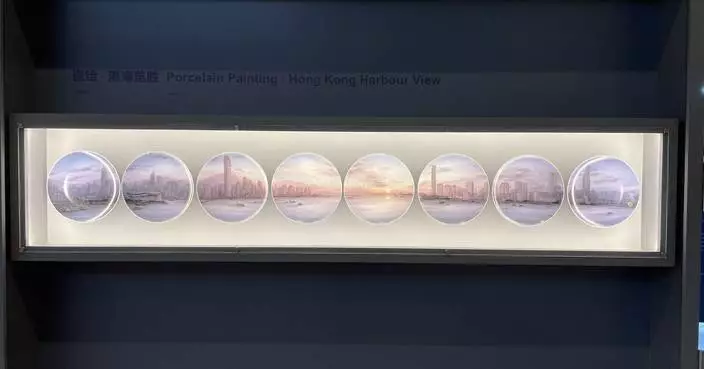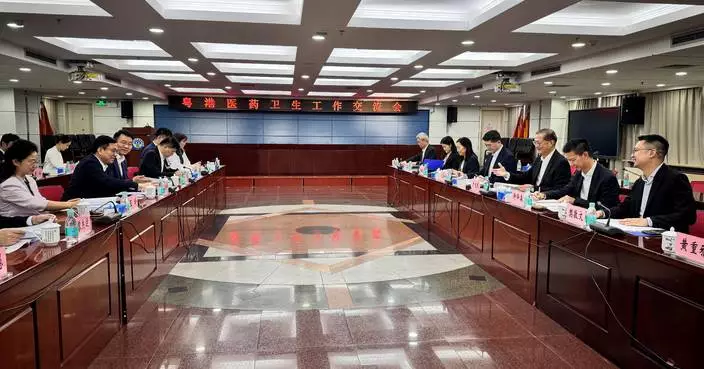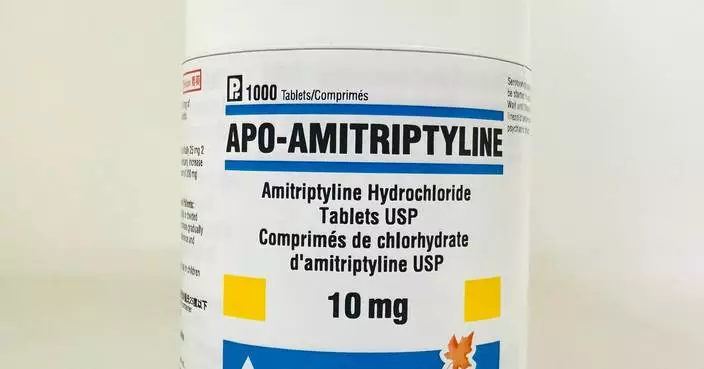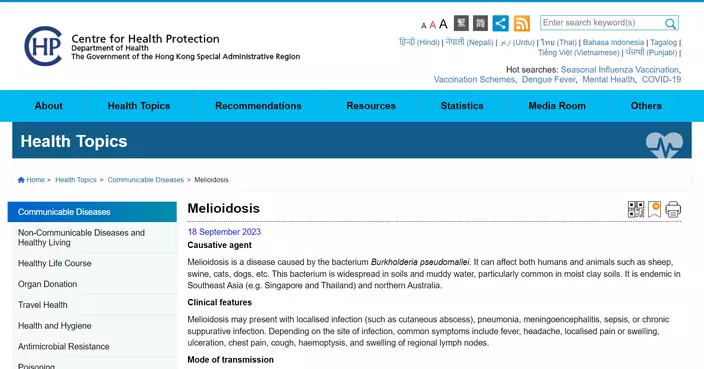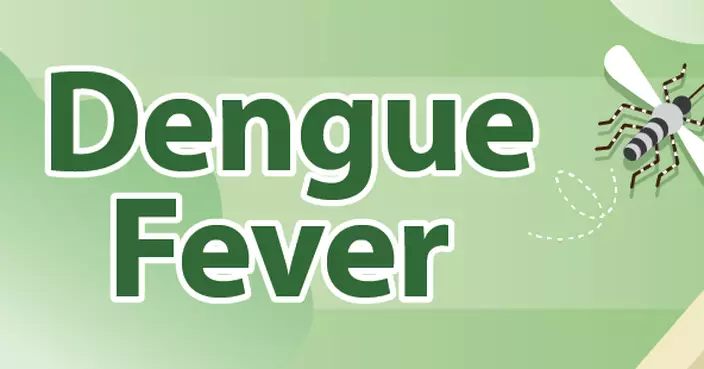CHP reminds public on precautions against heat stroke during very hot weather
The Centre for Health Protection (CHP) of the Department of Health (DH) today (October 19) reminded members of the public, particularly those undertaking outdoor activities, to take heed of necessary measures against heat stroke and sunburn in very hot weather.
"The public should carry and drink plenty of water to prevent dehydration while engaging in outdoor activities," a spokesman for the CHP said.
"Those engaged in strenuous outdoor activities should avoid beverages containing caffeine, such as coffee and tea, as well as alcohol, as they speed up water loss through the urinary system," the spokesman explained.
"Infants and children, the elderly, pregnant women, those with chronic illnesses such as heart disease or high blood pressure, outdoor/manual workers, and individuals who are overweight are more vulnerable to heat stroke. They should pay special attention," the spokesman added.
The public should adopt the following precautions:
Wear loose and light-coloured clothing to reduce heat absorption and facilitate sweat evaporation and heat dissipation;
Avoid vigorous exercise and prolonged activities like hiking or trekking as heat, sweating and exhaustion can place additional demands on the physique;
Perform outdoor activities in the morning or the late afternoon, if possible;
For indoor activities, open all windows, use a fan or use air-conditioning to maintain good ventilation;
Do not stay inside a parked vehicle; and
Reschedule work to cooler times of the day if feasible. If working in a hot environment is inevitable, introduce shade in the workplace where practicable. Start work slowly and pick up the pace gradually. Move to a cool area for rest at regular intervals to allow the body to recuperate.
The public should also note the latest and the forecast Ultraviolet (UV) Index released by the Hong Kong Observatory (HKO). When the UV Index is high (6 or above):
Minimise direct exposure of the skin and the eyes to sunlight;
Wear long-sleeved and loose-fitting clothes;
Wear a wide-brimmed hat or use an umbrella;
Seek a shaded area or put on UV-blocking sunglasses;
Apply a broad-spectrum sunscreen lotion with a minimum sun protection factor (SPF) of 15, preferably higher. Reapply every two hours if you stay out in the sun, and after swimming, sweating or towelling off; and
While using DEET-containing insect repellents for personal protection against mosquito-borne diseases, apply sunscreen first, then insect repellent.
If symptoms develop, such as dizziness, headache, nausea, shortness of breath or confusion, rest and seek help immediately, and seek medical advice as soon as possible.
The public may obtain more information from the DH's Health Education Infoline (2833 0111),heat strokepage andUV radiationpage; the HKO's Dial-a-Weather (1878 200),latestweather report and forecast,UV Indexand weather information forhiking and mountaineering; andpress releasesof the Labour Departmenton precautions against heat stroke for outdoor workers and their employers when the Very Hot Weather Warning is in force.
Remarks by SCST and AD of AFCD (Inspection and Quarantine) on incident of animal death at HKZBG at media session
Following is the remarks by the Secretary for Culture, Sports and Tourism, Mr Kevin Yeung; and the Assistant Director of Agriculture, Fisheries and Conservation (Inspection and Quarantine), Dr Thomas Sit, on the incident of animal death at the Hong Kong Zoological and Botanical Gardens (HKZBG) this afternoon (October 18):
Secretary for Culture, Sports and Tourism: Eight monkeys were found dead in the Hong Kong Zoological and Botanical Gardens on October 13, while two others feeling unwell were being isolated, and one of which passed away on October 14.
With concerted efforts from relevant departments, expedited autopsies, pathologic diagnosis and tests, and after discussions among the relevant departments, it is confirmed that the monkeys’ death is due to infection of melioidosis. We are saddened by the passing of the nine monkeys.
Under normal circumstances, melioidosis infection is through contact with contaminated soil and surface waters but not person-to-person or animal-to-person.
The park had soil digging works in early October. Together with the following possibilities, the monkeys might have had contact with the bacteria.
• Staff working at the Mammals Section carried the contaminated soil with the shoes they wore to the cages, or
• Infected monkeys with high counts of bacteria in close contact with other monkeys etc.
In addition, the incubation period for melioidosis in primates is about a week, and this matched with the period after the soil digging works. The nine monkeys died of melioidosis may be related to the soil digging works in proximity.
The LCSD has already taken several precautionary measures after animals were found dead:
1) The Mammals Section of the Gardens (HKZBG) has been closed since October 14.
2) Thorough disinfection and cleaning have been carried out in the animal cages involved.
3) Appropriate protective gear have been provided to staff who work there and staff’s health condition is being closely monitored. At present, their health is normal.
4) Staff concerned are all tested negative for the bacteria.
We will continue monitoring the mammals in the gardens and remind staff to pay attention to their own condition, and to report immediately if any of them feels unwell.
Reporter: Did the monkeys show any symptoms of the disease? Why operators did not realise that prior to their death? Because this is also a disease which can also affect human, is there a need to close the whole facility to prevent visitors from being affected?
Secretary for Culture, Sports and Tourism: Let me tackle the second question first, whether there is a need to close down the whole garden. As I said, we have taken all the cleansing and disinfection measures on the cages. So, with all these measures, we believe that it is now clean and free of the bacteria. We have also cordoned off the whole Mammal Section for the time being, so there will be no sort of contact between normal citizens and the animals. At this stage, I think these measures are sufficient to protect both the citizens as well as the animals in the zoo.
Assistant Director of Agriculture, Fisheries and Conservation (Inspection and Quarantine): As far as I know, according to the vet in charge of the Hong Kong Zoological and Botanical Gardens, he said before that the animals have already lost their appetite. They were a bit of inappetence and a bit quieter than normal. The onset of all the clinical signs only took two days, and then there was a sudden death of animals. The vet has already taken all the measures to treat the monkeys. However, these affected monkeys could not make it. And he had to perform post-mortem and isolate other animals to prevent further spread of the disease.





